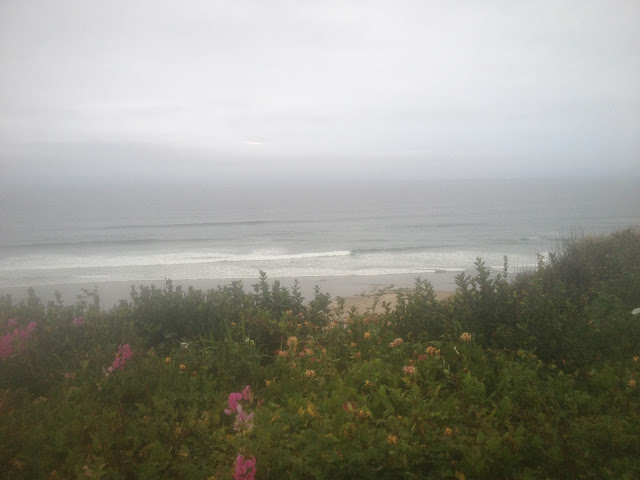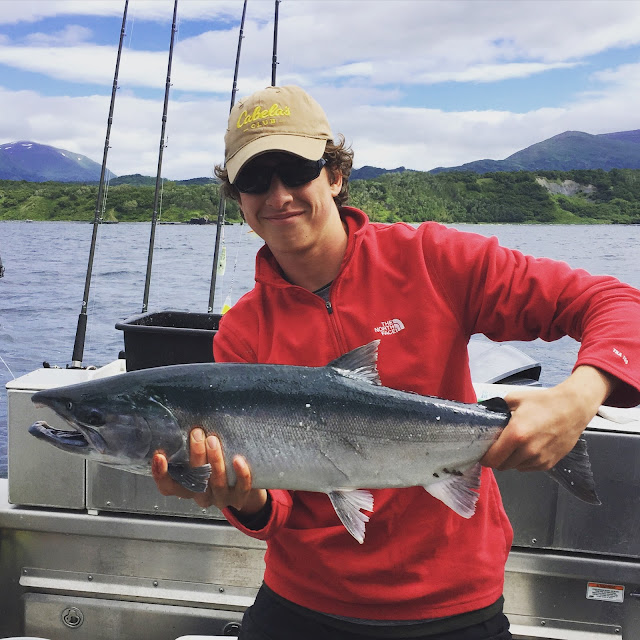Most people would be physically and mentally exhausted after a day of kayak fishing. The backbreaking paddling causes your legs and core to cramp uncontrollably, the jigging tires out your arms and renders them unusable, and the rigid, uncomfortable seat contorts your back into strange, painful positions for hours at a time. Nearly all the kayak fishermen I saw after the tournament could barely talk and were more focused on finding something soft to collapse on. I felt the same, but even intense physical fatigue wasn't enough to keep me from fishing. As soon as I was finished putting away my bottom fishing tackle and kayaking equipment, I immediately began rigging up a surfperch rod and raced off to nearby Agate Beach.

One of my favorite things about surf fishing is its availability. To go salmon fishing or bottom fishing off the Oregon Coast, there's usually a lot of planning involved. I can't just head out to the open ocean at any time or in any weather conditions in a kayak without expecting to eventually find my name on a Depoe Bay memorial plaque. Even the jetties require driving to one of the few towns that have them. However, surf fishing can be done anywhere. Although I prefer the steeply sloped beaches of the central and southern coastline to that of the northern Oregon Coast, surfperch can be found anywhere there's a sandy or rocky beach. Within five minutes of casting and retrieving a Gulp! sandworm into the waves, I got a bite.

If anything, my preceding years of unsuccessful surfperch fishing have only been learning experiences. Through repeated trial and error, I eventually found an effective method of targeting Redtail Surfperch. For starters, the number one mistake I used to make was randomly walking up to the beach at a random time of the day with random tides and expecting to catch a fish. It's extremely important to
fish during the incoming tide. An incoming tide floods the sand previously exposed by the low tide and flushes up all sorts of edible critters. The surfperch follow the tide and feed heavily on the sand crabs, worms, and clams that get washed up by the waves. Although they can do this at any time of day, I've found the most success fishing for them in the late evening, even when the sun goes down. Although surf fishing at night during an incoming tide isn't the smartest idea, I've caught some of my biggest perch in these conditions. However, they can bite at any time of day.

As for tackle, I usually use a steelhead rod or similar. The conventional surf casting telephone poles that I see most people using are tiring to cast and to hold. In addition, you can never feel the fish on the other end of the line. On the other end of the scale, the ultralight tackle you see Socal surf fishermen using is inappropriate for the rougher surf of the Oregon Coast. The steelhead rod enables me to appreciate the scrappy fight of these fish while simultaneously having casting power.
 |
| Yes, this is the same picture from my charter advertisement in the last post. |
The light tackle approach also enables me to fish without carrying as much stuff. Unlike other kinds of surf fishing, which involve planting a rod spike into the sand and collapsing into a beach chair, perch fishing is highly mobile. I don't want to lug around a bucket of sand shrimp or crabs everywhere I go, nor do I want to be weighed down with dozens of heavy sinkers. With the gear I typically use, I can fit everything into the front pocket of my waders.

The beach was practically empty. There would be couples walking down the beach with their dogs and teenagers spray painting abandoned shacks, but I found myself alone for most of the time. This kind of fishing is extremely different from the bottom fishing I was doing earlier in the day. Whereas the latter consists of jigging with heavy meat sticks and eight ounce lures in deep water, surf fishing is done with light tackle in the shallows. The surfperch themselves are also more refined and tropical looking than the brutes I had been wrestling up from the depths that morning. In addition to the redtails, I found several schools of Silver Surfperch. Silvers are much smaller and less scrappy than the larger and more aggressive Redtails, but they are also fun to catch.

I don't like taking fish pictures while in the surf. The constant sneaker waves and sudden changes in current make it easy for me to drop whatever I'm holding into the water, whether it be a sinker, a flopping fish, or an expensive camera phone. I always keep my phone in a waterproof case, but it sinks like a rock and I always feel nervous taking it out. In addition, the screen stops working when covered in fish slime and water, forcing me to resort to taking blurry screenshots.
 |
| For some reason, the camera got stuck on "square" for the rest of the day. |
After getting creamed by one sneaker wave too many, I decided it was high time to leave. I can never walk away from the beach right after catching a fish (there might be more), but the sun was starting to set and I hadn't realized how far down the beach I was until now. I had a long trek back to where my car was parked, and the tide was starting to go out again. Besides, I was intent on giving jetty fishing a try the following morning.
 |
| Think of the hundreds of dollars of tackle snagged down there. |
I honestly don't know why I keep going back to the Barview Jetty. Of all the places I've fished for bottom fish, the numerous jetties of the Oregon Coast stand as the most frustrating and the least productive. The craggy rocks, as I've ranted about before, are horrible and ensnare anything that comes near them. Unlike bottom fishing, where your bait or lure is directly beneath you, jetty fishing involves casting across dozens of rocks and having to reel your rig through them during each retrieve. It's a gauntlet of tackle loss, and on this occasion I lost thirteen sinkers in only a couple hours of fishing. I am convinced that the particular number is more than just a coincidence. The jetty itself is also slippery and quite dangerous to walk on, especially in the flip-flops that I usually wear. Although I hear about people routinely catching rockfish and giant Lingcod from the rocks, I always seem to only hook small Kelp Greenling.
 |
| The prize of the jetty fisherman. |
It's a shame that I don't do as well off of the jetties as I'd like. Although the best ones are a long drive away from Portland, they are relatively convenient and don't require as much planning or physical exertion as bottom fishing from a kayak. The habitat is ideal for fish; the same rocks that I routinely snag on are also great hiding places for dozens of popular game species. In addition, I have numerous friends that are constantly asking for me to take them fishing. Since I don't feel comfortable setting them out on the ocean, someplace like a local jetty would be a great option. Hopefully I will begin to figure out jetty fishing to the point where I can expect to catch fish other than little Greenling.
 |
| The Barview jetty even has its own tackle store! There's gotta be good fishing there. |
Time to replace those thirteen sinkers.
Kamran Walsh.
 |
| That's me! |














Nice informative post, great job keep it up ! Cousins Surf Rods are built with some added design features in mind.
ReplyDeleteGet the most exciting, most reliable deals and coupons the make your aquarium go and checkout saltwater fish
ReplyDelete